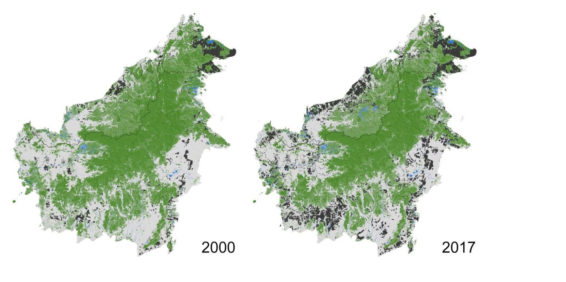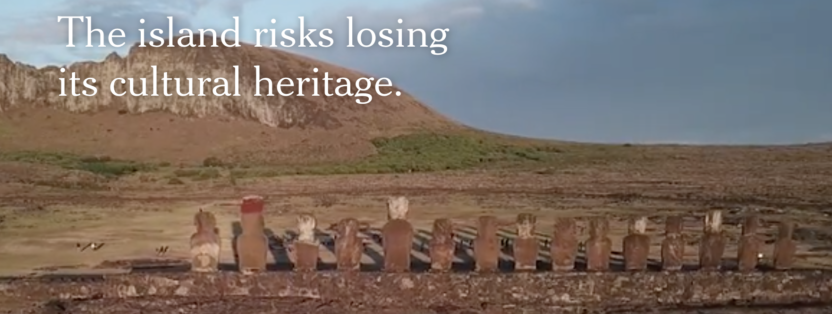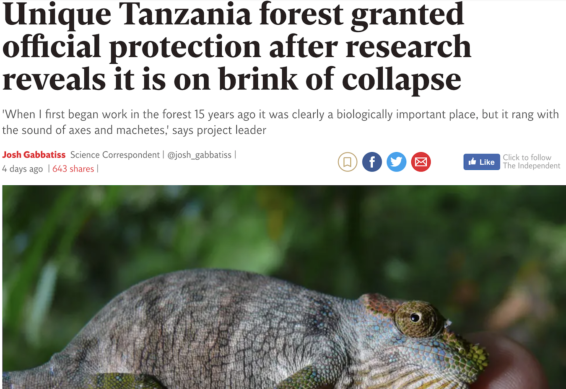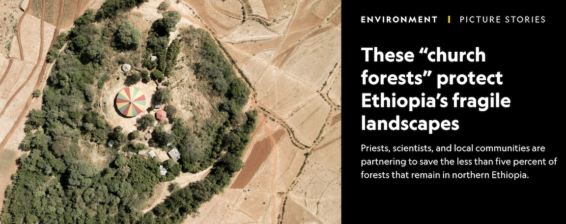In Forests News last week:

Is deforestation in Borneo slowing down? READ
A new CIFOR study has revealed a deforestation slowdown on the island of Borneo in 2017. The paper looks to a slump in palm oil prices as its main cause.

Making connections: New funding opens dialogue on landscape approach efforts READ
Coverage from the GLF in Bonn, Germany, where panellists from UNEP, CIFOR and World Bank discuss a landscape approach to tackle poverty, food insecurity, climate change and biodiversity loss.

Barking up the same tree: ‘Water and forests cannot be separated’ in East Africa’s Rift Valley READ
Water, forestry departments and communities come together to create management plans that work from the highlands through to the lowlands.
Forests News’ pick of stories from the world’s press:
Rising temperatures threaten cultural heritage

Credit: The New York Times
On social media The New York Times reran a lauded five-part series that did the rounds again on Twitter over the weekend. The multimedia story delves into the threat that climate change looms over the world’s most famous heritage sites: Warming seas in the Galapágos face its creatures with their biggest evolutionary test, swelling seas sweep up Easter Island’s cultural heritage, the rapidly changing ecosystem of Yellowstone National Park leave little time for its animals to adapt, drier weather chokes Lebanon’s millennia old cedars, and rising seas steal stone age landmarks in Scotland’s Orkney islands.

The Tanzanian government has granted protection of a forest after sobering research revealed it to be nearing total wipe-out. The Independent reports of a new agreement drawn up by scientists, authorities and local villages to ensure the future of the Magombera Nature Reserve, which has been hampered by poaching and illegal logging in recent decades. The forest is home to a newly discovered chameleon, galagos (adorably known as bush babies) and elephants- packing an impressive biodiversity punch in a relatively small area.
1000s of students in Northern Europe take to the streets to demand climate change action

Major global media titles gave light coverage to student’s who skipped school to join climate change protests across Northern Europe on Friday. The marches were inspired by 15 year-old Swedish student Greta Thunberg, who told leaders at the UN climate talks in December they were ‘not mature enough to tell it like it is.’ The BBC published a video of students in Belgium who came out in their thousands to pound the streets.
Ethiopia’s “church forests” give faith for restoration

In The National Geographic – a photo essay explores island forests in Ethiopia, who have avoided total devastation thanks to the churches that are nestled inside them. The Ethiopian Orthodox Tewahido Church created their sanctuaries in patches of shady forest as early as fourth century AD, and now their priests are joining with scientists and communities to save what’s left of the forest. Though surrounded by wheat fields and monocultures, scientists hold faith in the restoration prospectives of the region.
Feed the world in a better way
Millions of people will die from obesity, heart disease and diabetes, and with it cause “catastrophic” damage to the planet thanks to our diets, a landmark health study in The Lancet said this week. News outlets in China and Australia ran the story, reporting that a billion people still go hungry, two billion eat too much of the wrong foods, whilst the global food system takes the title of ‘biggest emitter of greenhouse gases’. Eating less grain fed beef and doubling the average intake of fruits, nuts and vegetables concluded the research.
Trump deals with wildfires by increasing deforestation

For someone who expertly knows how to grab the headlines, this was an executive order the US president has passed ‘quietly,’ The Independent reports. According to the article, Trump has passed up the introduction of a suite of policies to deal with the wildfires- including a plan to tackle climate change by reducing US emissions – to instead place his bet on timber expansion. The new order instructs the agriculture and interior secretaries to consider timber production on millions of hectares of land, before putting it up for sale. If carried out, this would increase deforestation by over 30 percent. Fire ecologists are sceptical about the proposed new approach.
Can’t live without coffee? Scientists warn of bad tastes and price hikes

A collaborative study with Ethiopian scientists and the UK’s Royal Kew Gardens has warned that the world’s most popular coffee beans are facing extinction. CNN uses the report published in Science Advances to cite deforestation as coffee’s biggest threat, with climate change coming in a close second. Fewer wild crops will mean that coffee will not only become ever more expensive. but will taste worse too.
We want you to share Forests News content, which is licensed under Creative Commons Attribution-NonCommercial-ShareAlike 4.0 International (CC BY-NC-SA 4.0). This means you are free to redistribute our material for non-commercial purposes. All we ask is that you give Forests News appropriate credit and link to the original Forests News content, indicate if changes were made, and distribute your contributions under the same Creative Commons license. You must notify Forests News if you repost, reprint or reuse our materials by contacting forestsnews@cifor-icraf.org.
